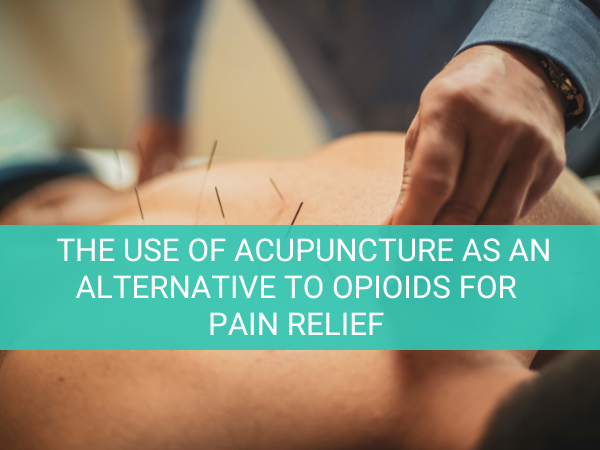Opioids have been used as a pain treatment for thousands of years. In the U.S., opioids were used to treat soldiers fighting in the Civil War, and many of those soldiers went on to develop a dependency on the drug.
Today, another opioid crisis is underway – one that dates back to the late 90s. Right before the turn of the millennium, doctors began mass-prescribing opioids as a frontline option for various pain-related health issues. In the early 2000s, the number of opioid overdoses and deaths spiked and hasn’t come down since. Worse, opioid overuse has driven some people to seek out dangerous synthetic opioids, including fentanyl.
U.S. and world health agencies now recognize the threat that opioids pose to many. As such, researchers are looking for safer alternatives to opioid drugs – and acupuncture is at the top of the list.
Opioid Use Disorder is Causing a Health Crisis in the U.S.
From 1999 to the present, the number of annual opioid-related deaths in the U.S. has quadrupled. From 2019 to 2020 alone, the number of opioid overdose deaths increased by 30 percent. More than 165,000 people have died since the crisis started in 1999 – and the number of people addicted to heroin and synthetic opioids has also skyrocketed.
A patient can develop a dependency on opioid pain medication in just days. After just a single dose, patient psychology may be altered, leading to a higher risk of dependency.
What Are the Side Effects of Opioid Pain Medications?
Opioid use can cause physical and psychological side effects. Some of them include:
- Drowsiness
- Confusion
- Elevated mood
- Nausea and constipation
- Slower breathing
That last side effect – slowed breathing – may result in long-term complications if opioids are taken for extended periods. Slower breathing can lead to hypoxia, the medical term for insufficient oxygen delivery to the brain. With time, hypoxia can cause permanent brain damage and even coma.
Doctors Are Looking for Safer Alternatives to Opioids – and Acupuncture is One Option
Medical researchers are investigating an array of opioid alternatives and therapies that can reduce the impact of opioid dependence. Among these alternatives are forms of complementary medicine, including acupuncture.
Of those complementary modalities, acupuncture is considered one of the most promising, and has been recommended by multiple agencies – including the American College of Physicians and the CDC – for chronic pain conditions. Given its potential in resolving chronic pain, acupuncture is emerging as a primary support option for people who would be put on long-term opioids.
What Does the Medical Research Say About Acupuncture as an Alternative to Opioids?
A wave of in-progress medical studies is aimed at acupuncture and how it can help with pain management and opioid overuse. However, there is already some research on the subject, and the results from those early studies are promising. They include:
- A 2002 study in Pain that showed acupuncture’s potential in reducing opioid usage following certain forms of surgery. Specifically, the patients in this study received electroacupuncture following abdominal surgery. The researchers found that acupuncture reduced the acute need for opioid pain medication. In other words, surgery patients required less pain medication immediately following surgery (the effect was most pronounced on the first day after surgery).
- A 2002 study in Acupuncture Med., which also demonstrated the above effect. This study also looked at post-surgical patients and found that acupuncture reduced patient’s pain and perceived need for pain medication.
Additional studies have backed this result up. Collectively, research strongly suggests that acupuncture offsets some of the immediate need for pain medication after surgery. While the effect is strongest at the beginning of treatment, minimizing opioid use upfront can prevent some instances of physical dependency, given how quickly it can form.
Acupuncture Can Also Help Patients Experiencing Opioid Withdrawal
For people who are already taking opioids for pain, acupuncture can support attempts to taper off the drug usage. It’s critical that this is done with a clinician’s guidance, as withdrawal symptoms are common for people coming off opioids. Those symptoms may include:
- Anxiety and agitation
- Sweating
- Runny nose
- Muscle pains
- Difficulty sleeping
- Abdominal cramps
- Nausea and vomiting
- Diarrhea
While the above symptoms can cause severe discomfort, they rarely develop into a medical emergency. However, withdrawal is often so uncomfortable that patients have difficulty reducing their intake of opioids.
Acupuncture can also help here, as it’s used to treat many of the symptoms associated with opioid withdrawal. This includes efficacy with the following:
- Abdominal pain and cramps
- Muscle pain and cramps
- Anxiety
- Difficulty sleeping
- GI discomfort and diarrhea
Acupuncture is effective against a broad spectrum of symptoms because it addresses the patient’s whole-body health, instead of targeting specific organs or regions of the body. While research is still investigating exactly how acupuncture works, a leading theory is that acupuncture stimulates the nervous system into releasing beneficial biochemicals. Endorphins and other pain-fighting compounds are among them, so acupuncture may help the body heal and protect itself from pain. Further, endorphins can boost brain activity and mood, which can offset the anxiety and agitation associated with opioid withdrawal.
Opioid withdrawal can be debilitating, but it’s typically short-lived and can be mitigated with acupuncture.
In the Fight Against Opioid Overuse, Acupuncture May be a Houston Doctor’s Best Tool
While opioids are effective for what they’re prescribed for, they come with significant risk – including severe side effects and possible addiction. It’s clear that safer alternatives are needed – alternatives like acupuncture. Houston Acupuncture’s strong track record and minimal adverse effects position it as a potential opioid-reducer. For patients, that means a reduced reliance on high-risk pharmaceuticals like opioids, without reduced comfort.

